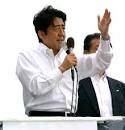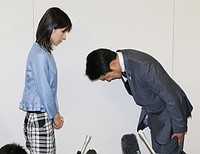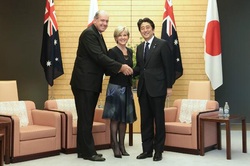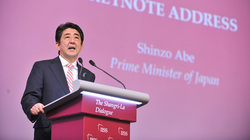 Source: asahi.com
Source: asahi.com
 Source: asahi.com Source: asahi.com As a short aside to my usual posts, readers might interested to know that in the Australian House of Representatives on Tuesday afternoon, House Leader Christopher Pyne made the formal announcement of PM Abe’s address to Parliament on July 8th. Here the link to the motion statement and the opposition’s response.
 Source: jiji.co.jp Source: jiji.co.jp At the very outset, I should apologise for being remiss in the writing on this blog. Normally I do try to update it on the weekly basis, however recent developments (i.e., an impending visit to Australia by PM Abe) are having something of an impact on my scribbling. The main story to emerge out of last week’s Diet activity was the announcement on Thursday evening that despite discussions, the New Komeito were yet to be convinced of the arguments for constitutional re-interpretation in favour of collective self-defence. As such, it does appear that the current regular session of the Diet will expire without any agreement on the manner in which collective self-defence will be defined, a particularly sticking point for the New Komeito which has reservations about exactly how and when the SDF should act in ‘defence’ of Japan (this particular view from Alexander Sullivan expresses some of the frustrations felt by those in the foreign policy community towards the New Komeito’s position and how it seems to ignore the threats to Japan’s territorial sovereignty). Meanwhile, more media attention was paid to a story at the beginning of the week that the Tokyo Metropolitan Assembly had been the scene of some blatant sexual harassment directed at Shiomura Ayaka (35) of the Your Party. During a debate on government subsidies for women in order to increase their workforce participation on June 18, Shiomura said that the average age of women having their first child in the Tokyo area was 32 while at the same time women were undergoing fertility treatment at considerable expense to themselves and that support should be made available from the government. Some male members of the LDP then decided that this would be an opportune moment to shout out “You are the one who should get married as soon as possible”, along with “Can’t you even bear a child?” and some alleged remarks concerning her possible relationship with Your Party member Mitani Hidehiro. Never mind the fact that these comments belittled Shiomura in front of the Assembly by questioning both her marital status and her fertility, those who shouted out such comments then proceeded to behave in a most cowardly way by not owning up to their heckling. It wasn’t until Monday, when the story had gained a life of its own and resulted in a petition starting on Change.org to get those politicians responsible to resign, that 51 year old LDP member Suzuki Akihiro came forward to take responsibility for questioning Ms Shiomura’s unmarried status. In what stands as a fairly pathetic excuse for his behaviour, Suzuki said… “Lightheartedly, I hoped women will get married soon because I thought that might alleviate the problems we face in Japan of low birth rates and late marriage,” and claimed that he did not know that his comment(s) were insulting. Such was the damage caused that LDP Party Secretary Ishiba Shigeru made a remark of his own on Sunday, saying that “Whoever made the sexually harassing remarks should admit and apologize. If it’s someone from my party, we must apologize as a party.” (J) Whether this actually occurs is debatable, given that Suzuki is the only one who has come forward over the incident as a sort of ‘sacrificial victim’ to the media to try and take some heat out of the story. This has of course made Suzuki a target for retaliation, as occurred on Monday evening when his electoral office was bombarded with raw eggs (J). So far Suzuki has not been called upon to resign and has given no indication that he will. In a study into female participation in politics, the Gender Equality Bureau Cabinet Office published a graph showing that of the countries surveyed, the participation of women in politics in Japan in 2002 was at 7.3%, only marginally higher than South Korea (and far below Sweden with a participatory rate of 45.3%). According to a Huffington Post Japan article from last year, statistics released at the Davos World Economic Forum on gender equality stated that of the 136 countries surveyed, Japan ranked 105th in terms of its equality between the sexes (although Japan once again outdid South Korea, which ranked 111th. The score itself was tied to the lack of female representation in politics) (J). Clearly Japan has a deficit in female politicians, which itself accounts for the relative laxity concerning gender issues in Japan itself and the prevalence of attitudes towards women in politics that should have died out long ago. If PM Abe truly does believe that the role of women in society is in need of support then this is one place that the LDP/New Komeito could start looking at in earnest, for without adequate representation those ambitions of PM Abe for a greater female involvement in society will remain just that – ambitions.  Source: Australian Embassy in Tokyo Source: Australian Embassy in Tokyo Over the past two days Australian Foreign Minister Julie Bishop and Defence Minister David Johnston spent a good part of their time in Tokyo, meeting with their Japanese counterparts as part of the (restored) annual 2+2 dialogue between both countries. From the joint communiqué released after the meeting, things apparently went very well, so much so that both sides committed to furthering their defence ties, technology sharing, and were both adamant in their condemnation of any attempt to change the status quo without recourse to international law first. This message was reiterated during the press conference held thereafter. During their Tokyo visit, both Australian ministers also called upon PM Abe, who very genially praised the work that Tony Abbott had done during his visit to Tokyo in April, and stated that he was looking forward to his up-coming Australia trip. Now, clearly this 2+2 was held for two reasons; one, to confirm the security stance of both sides on territorial issues, and two, to explore options for furthering security relations, particularly (if not downright exclusively) concerning the sharing of `marine hydrodynamic` technology – aka submarines. David Johnston for his part took a tour of the sub pens at Yokosuka to get an up close and personal look at the Soryu class, a submarine he has had his eye on for some time, and voiced his eagerness for Japanese involvement in the future submarine project ($). Such dialogue will have been noticed in Beijing, and it may be that as Rowan Callick suggested, Australian diplomats in China are having a somewhat more difficult time of late trying to explain why Australia is pursuing defence relations with Japan so eagerly ($). Quite frankly, such questions are already plainly obvious, and it may be that the Chinese just want to hear it from Australia first. If push comes to shove, Australia is going with the side it knows best and it ain`t China, no matter how many `joint exercises` are planned between the ADF and PLA. Not that things will be entirely trouble-free for the burgeoning Australia-Japan relationship. The news this week that Japan was considering ways in which to resume commercial whaling was met with something resembling resigned disappointment from the Abbott government and indignation from every other major party. It is not necessarily wise for PM Abe to use up the goodwill generated towards Japan by declaring that Japan will implement the one issue to which Australia (and New Zealand, for that matter) so vehemently object (kudos to Robert Ayson for pointing that out on Twitter). The Abbott government is probably hoping that the entire whaling issue will not even be raised in press conferences, although it would be a small hope. If it is raised, and if PM Abe takes the same stance as he did in the Diet during the week, it is quite possible that the reception for him won`t be quite as warm as Minister Bishop expects. It would be far wiser to drop the entire whaling issue for the time being, and only resume it once Japan has plans in place to implement it (if, in fact, it does have plans to implement it). PM Abe`s presence may also draw protestors from the Chinese and Korean communities in Sydney and Melbourne that object to his comments related to comfort women, the Kono statement, and war responsibility. Only recently was news made that both communities were planning to establish another bronze statue in Sydney depicting a young Korean woman, similar to that outside the Japanese Embassy in Seoul and in Glendale, California. This is to be expected, and probably already has been. What would be novel is if PM Abe addressed these protestors to both acknowledge the wrongs committed in Japan`s past, and to inform them that his government will implement collective self-defence for the benefit of allies and the region. It would be politically risky though, and very much out of character for PM Abe. It might, however, convince sceptics of Abe`s strong desire for a pro-active role by Japan to foster regional stability, and would take the wind out of the sails of the CCP argument that Abe is bent on reviving militarism.  Source: www.iiss.org Source: www.iiss.org Over the weekend the Shangri-La dialogue took place in Singapore, and as per expectations the rhetoric used by the various attendees was far more belligerent than at past meetings (Sam Roggeveen from the Lowy Institute said that it basically signalled that competition and confrontation would now distinguish Asia Pacific relations). On Friday PM Abe made the keynote address, in which he expressed the desire by Japan to make a more ‘proactive contribution to peace’ within the region. In particular, Abe spoke of the importance of the rule of law, indeed it was the overarching theme of the entire address, punctuated no less by four lines of poetry so that none might be left confused as to what Abe was driving at; “Peace and prosperity in Asia, forevermore Japan for the rule of law Asia for the rule of law And the rule of law for all of us” This speech was definitely meant for a Chinese audience, more so than it was meant for the other nations in the region. While Abe did not resort to the same sort of rhetoric adopted by US Defence Secretary Chuck Hagel, who lambasted China for de-stabilising of the region through its unilateral actions, Abe’s reiteration of the necessity of the rule of law along with freedom of navigation and over flight, and his commitment to providing nations within ASEAN with coast guard vessels to protect their EEZ, spelled out what Japan objects to with regard to China’s behaviour and how it intends to counter it. During his speech, Abe made reference to his attempts to create an agreement with China in 2007 concerning joint mechanisms for avoiding misunderstandings or incidents at sea or in the air, and how these had not eventuated. He also raised the point of how all should engage in dialogue, ‘exchanging smiles’ (although this is probably a little too optimistic). Abe also placed emphasis on the need for the EAS to become the premier multilateral dialogue in the region, which is an interesting statement, especially since it would mean superseding both APEC and the ARF. The EAS, unlike other dialogues (with the exception of the ADMM+) focuses intensely on security discussions, and provides a platform for all major and middle powers of the region to meet and discuss shared concerns. If Japan wanted to play a greater regional role, then the EAS would provide the largest mechanism on which to clarify its intentions and garner support from other nations. That might become more necessary in future, especially given China’s reaction to what was said during the dialogue. PLA Lieutenant General Wang Guanzhong, Deputy Chief of the General Staff Department of the PLA (why, pray tell, did they not send the chief? A subtle dig at the importance of the Shangri-La dialogue to China, perhaps? or was he dealing with the aftermath of the bombing in Xinjiang last week?) went off script during his speech, accusing Japan and the US of colluding before making their respective speeches, and accused PM Abe of having “overtly or covertly, explicitly or implicitly and directly or indirectly condemned China”. That comment in itself reveals something of Chinese government (or should that be military?) thinking regarding Japanese activity of late. This thinking regards any move by Japan as a threat to China, and so must be vociferously denounced in whatever public forum is available. It is entirely possible that Wang was told to express the views of the military during the dialogue, and that Wang’s segue was to occur should any country question China’s regional activities, particularly if it came from Japan or the US. It’s this type of rhetoric that has so concerned the region, because the opaque nature of Chinese decision making makes it particularly difficult to tell whether Wang’s speech was meant to placate or inflame regional opinion. If the intention was to placate fears it didn’t, as the message within the speech rang hollow in light of China’s recent actions towards the Philippines and Vietnam. The segue merely added to the concern, for it appeared that this was the real message that China wanted to send to the region, and that the rest of Wang’s speech need not have been made. Such developments may have helped to spur the speculation in this report from Reuters released late last week, which detailed the possibility of Australia acquiring not merely submarine technology from Japan, but a full fleet of vessels, constructed by Kawasaki and Mitsubishi Heavy Industries. If this is true, and it is unlikely that it is (see p.53 of the Australian Senate Estimates Committee Hansard record for the Department of Defence’s view on this), then it would be an escalation in bilateral dialogue on military technology exchange that surpasses that between Australia and the US, and lays down the foundation of what would be an eventual defence alliance between Australia and Japan. Now that truly would make China hit the roof, and would put the Australian government in a particularly precarious situation. Nonetheless, if there is no belief that China is prepared to negotiate on its territorial claims, and continues to act unilaterally to enforce those claims, then the emergence of alliances from unlikely places may just be a consequence of such action. |
AuthorThis is a blog maintained by Greg Pampling in order to complement his webpage, Pre-Modern Japanese Resources. All posts are attributable to Mr Pampling alone, and reflect his personal opinion on various aspects of Japanese history and politics (among other things). Categories
All
Archives
June 2024
|
 RSS Feed
RSS Feed